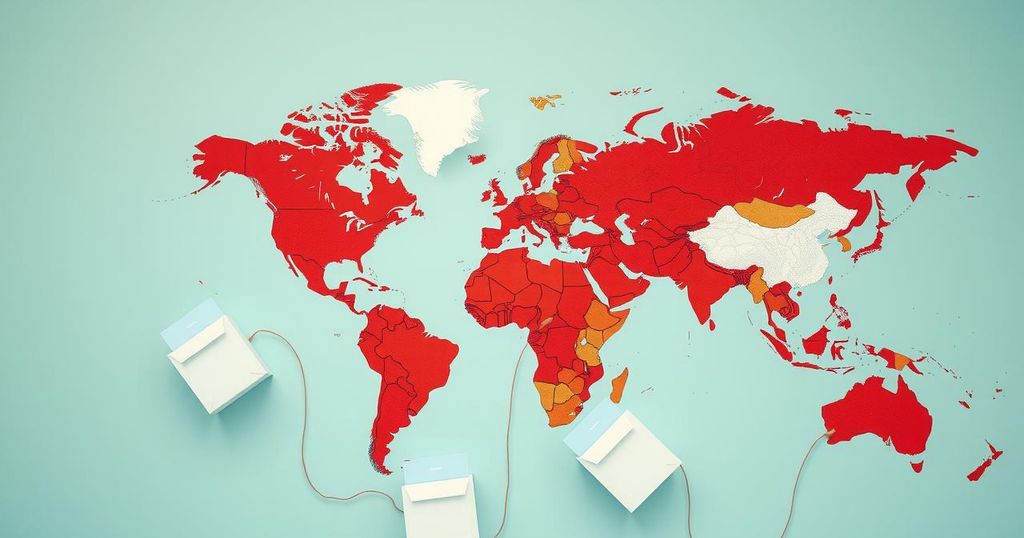In 2024, approximately 4 billion people voted in pivotal elections around the world. Ruling parties in South Africa and India faced declining support due to allegations of corruption, while European nations saw the rise of far-right parties. The United States witnessed Trump’s political comeback. Meanwhile, challenges emerged in various regions, including governmental instability in France and Mexico, leading to potential implications for international geopolitics moving forward.
In 2024, approximately four billion individuals participated in global elections, underscoring a significant surge in democratic engagement. Notably, both South Africa and India witnessed erosion in support for ruling parties, accompanied by rampant accusations of corruption and democratic backsliding. A noteworthy shift occurred in Europe, marked by an increase in far-right political support, while both France and Germany experienced governmental collapses. In the United States, Donald Trump made a formidable return to power.
The United States’ elections culminated in a dramatic reelection of Donald Trump on November 5, representing one of the most extraordinary political comebacks in American history. His campaign capitalized on public discontent surrounding economic issues and anti-immigration sentiments, ultimately securing substantial popular and electoral support amidst ongoing legal challenges. Republicans are reportedly strengthening their appeal with former Democratic voters, particularly among those lacking college degrees. Trump appears better prepared to implement his policies given the Republican control over both houses of Congress.
India’s electoral landscape shifted as Prime Minister Narendra Modi’s party, which was anticipated to secure an overwhelming majority, instead lost seats and was compelled to forge a coalition government. This alteration is viewed as a positive development for democracy, potentially complicating Modi’s ambitious identity-driven policies. The new government may encounter obstacles regarding Modi’s contentious proposals, particularly those impacting religious freedoms. Additionally, India continues to assert its independent foreign policy amidst US-China tensions.
In Indonesia, ex-general Prabowo Subianto was elected amid scrutinized circumstances, reflecting significant changes to his public image. His administration is expected to navigate complex international dynamics, potentially aligning more closely with China than the United States. This alignment could pose strategic challenges for Donald Trump’s incoming presidency, as he seeks to mitigate China’s influence.
France faced political upheaval following President Emmanuel Macron’s decision for a snap election, yielding a divided parliament without a clear governing coalition. The selection of Prime Minister François Bayrou has done little to stabilize France’s mounting debt issues, leading to broader implications for European security as major economies grapple with caretaker governance amidst rising tensions with Russia.
In the United Kingdom, the Labour Party ended 14 years of Conservative leadership, yet faces difficulties with public perception and mounting socio-economic challenges. The administration under Prime Minister Keir Starmer shows signs of struggling to address ongoing issues effectively, leading to potential repercussions for the UK’s future relationship with the European Union.
In Latin America, Mexico’s election resulted in Claudia Sheinbaum, the nation’s first female and Jewish president, continuing the leftist agenda of her predecessor. However, challenges surrounding organized crime and judicial independence persist, complicating her governance. Conversely, Venezuela’s election revealed systemic electoral issues as President Nicolás Maduro retained power amidst protests, highlighting ongoing national unrest.
Finally, the African National Congress of South Africa is experiencing significant ramifications from corruption scandals and grappling with public discontent, losing its parliamentary majority for the first time. Although coalition governance may steady certain economic trends, critical issues like poverty and unemployment remain unresolved, prompting a continued call for substantive reforms.
The year 2024 proved to be pivotal in global democratic participation, with around half of the world’s population participating in elections. Populist movements gained traction across various nations while established parties faced challenges, revealing growing discontent among electorates worldwide. Political shifts influenced major geopolitical dynamics, marking shifts in international relations and policy outcomes across continents, illustrating the interconnectedness of governance and public sentiment on a global scale.
In summary, the elections of 2024 served as a reflection of growing national discontent and shifting political landscapes across the globe. From the resilience of populist leaders like Donald Trump and Narendra Modi to the tumultuous political scenarios in Europe and Latin America, the year delineates a transitional phase in international relations. The challenges faced by numerous countries underscore the need for reforms to address vital socio-economic issues that continue to plague their societies.
Original Source: www.semafor.com






